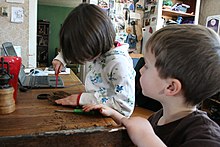
Back Ontskoling AF لامدرسية Arabic Анскулінг BE Desescolarització Catalan Unschooling Czech Unschooling Danish Unschooling German Αποσχολειοποίηση Greek Hejmlernado EO Desescolarización Spanish
This article has multiple issues. Please help improve it or discuss these issues on the talk page. (Learn how and when to remove these messages)
|

| Part of the Politics series on |
| Students' rights |
|---|
Unschooling is a practice of self-driven informal learning characterized by a lesson-free and curriculum-free implementation of homeschooling.[1] Unschooling encourages exploration of activities initiated by the children themselves, under the belief that the more personal learning is, the more meaningful, well-understood, and therefore useful it is to the child.
The term unschooling was coined in the 1970s and used by educator John Holt, who is widely regarded as the father of unschooling. Unschooling is often seen as a subset of homeschooling, the key difference lying in the use of an external or individual curriculum. Homeschooling, in its many variations, has been the subject of widespread public debate.
Critics of unschooling see it as extreme, and express concerns that unschooled children will be neglected by parents whom might not be capable of sustaining a proper educational environment, and the child might lack the social skills, structure, discipline, and motivation of their schooled peers. Critics also worry that unschooled children will be unable to cope with uncomfortable or challenging situations. Proponents of unschooling disagree, asserting that self-directed education in a non-academic, often natural and diversified environment is a far more efficient, sustainable, and child-friendly form of education than traditional schooling, as it preserves innate curiosity, pleasure, and willingness to discover and learn new things. However, some studies suggest that children who have participated in unschooling may experience academic underdevelopment.[citation needed]
- ^ Arnall, Judy (2018). Unschooling to University (1st ed.). Calgary, Alberta: Professional Parenting. pp. 5–8. ISBN 9781775178606.